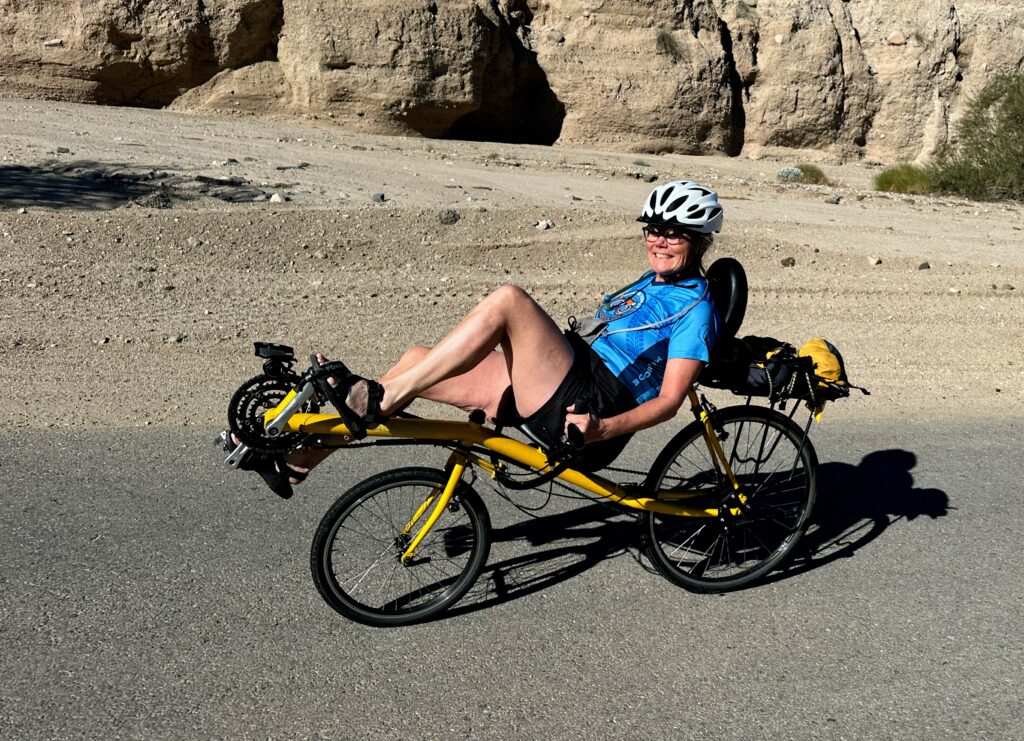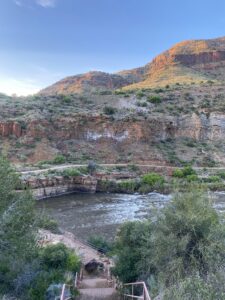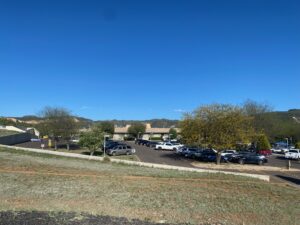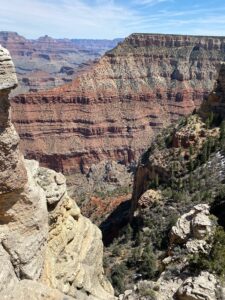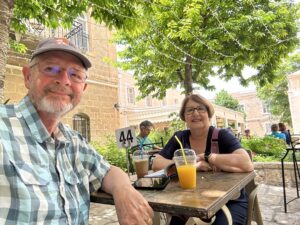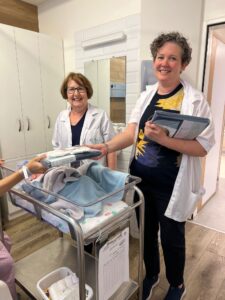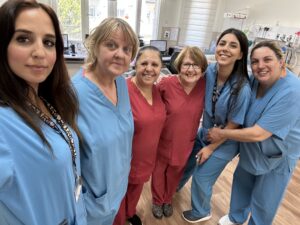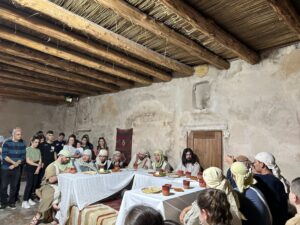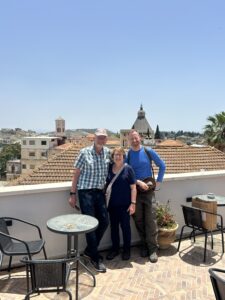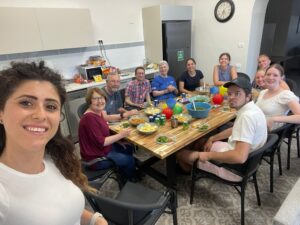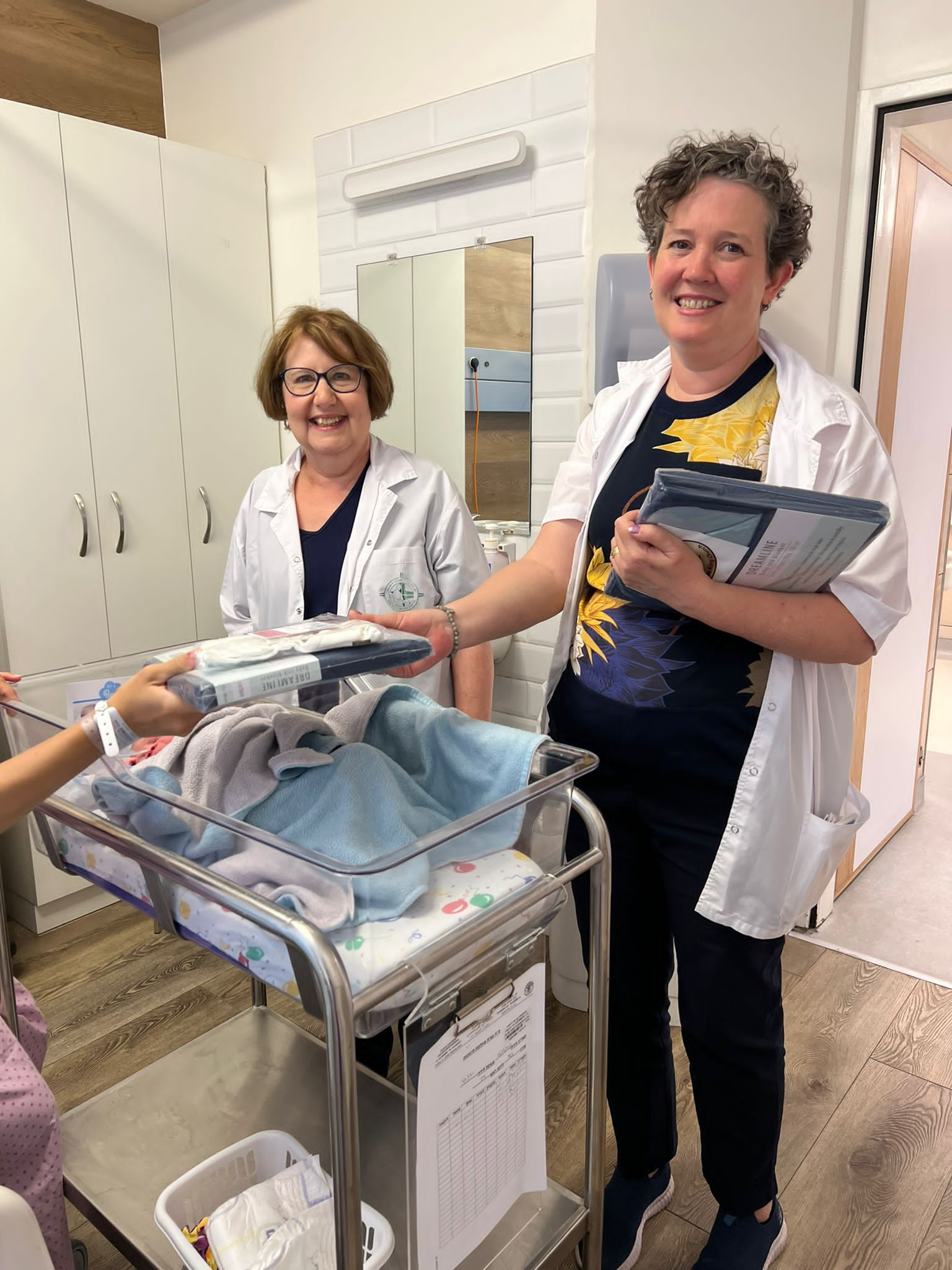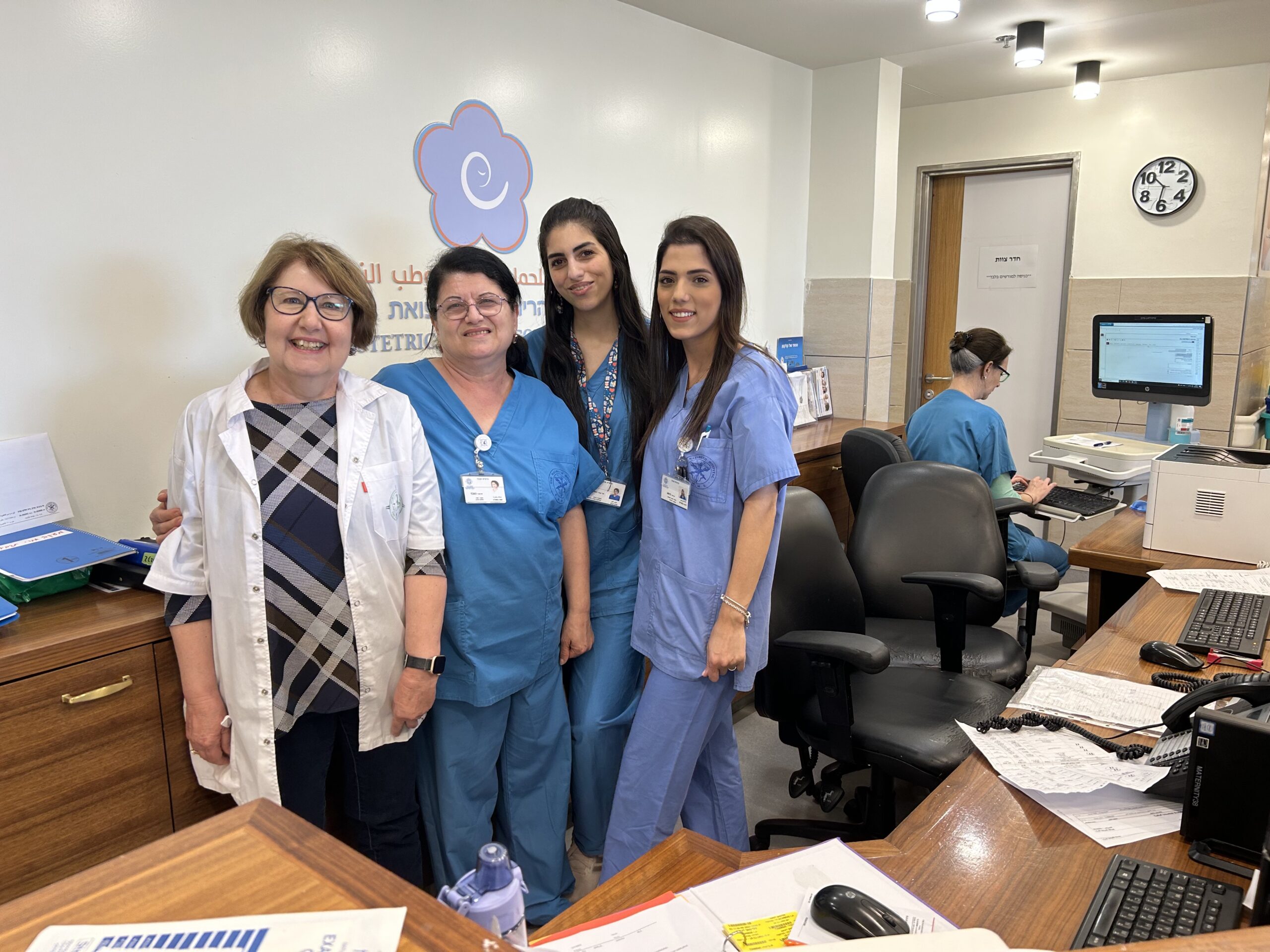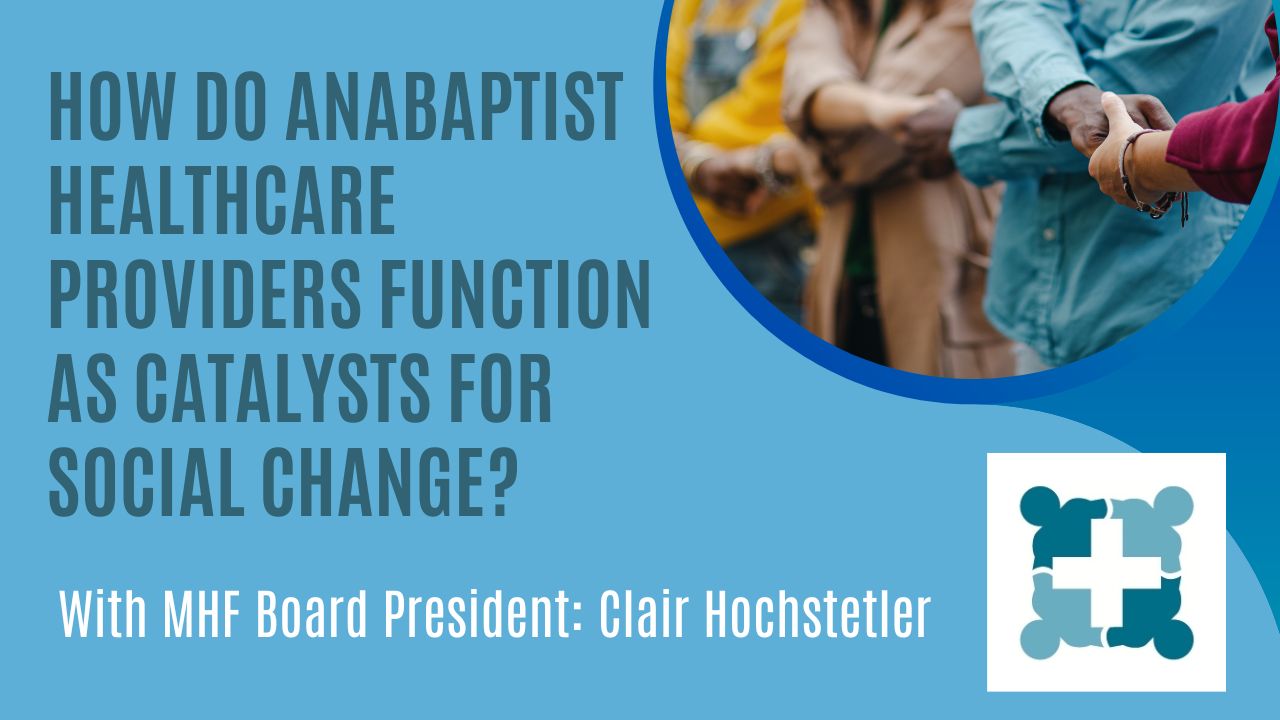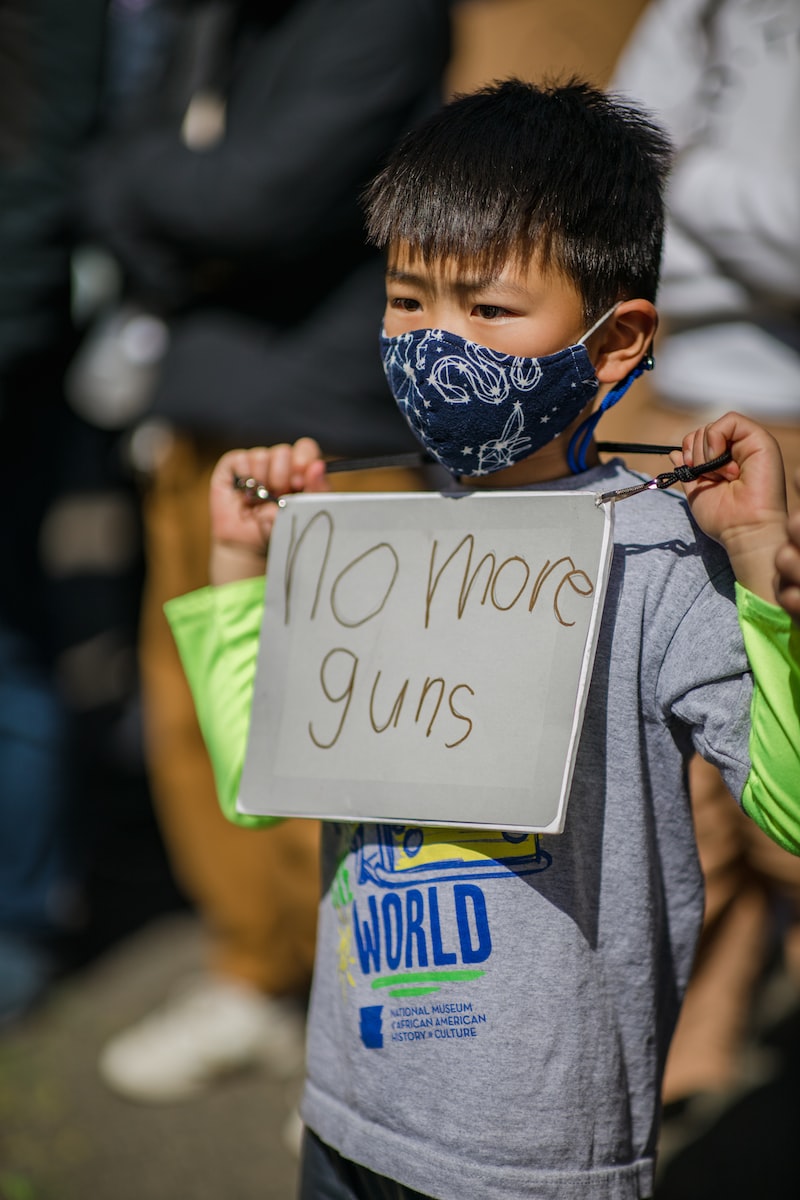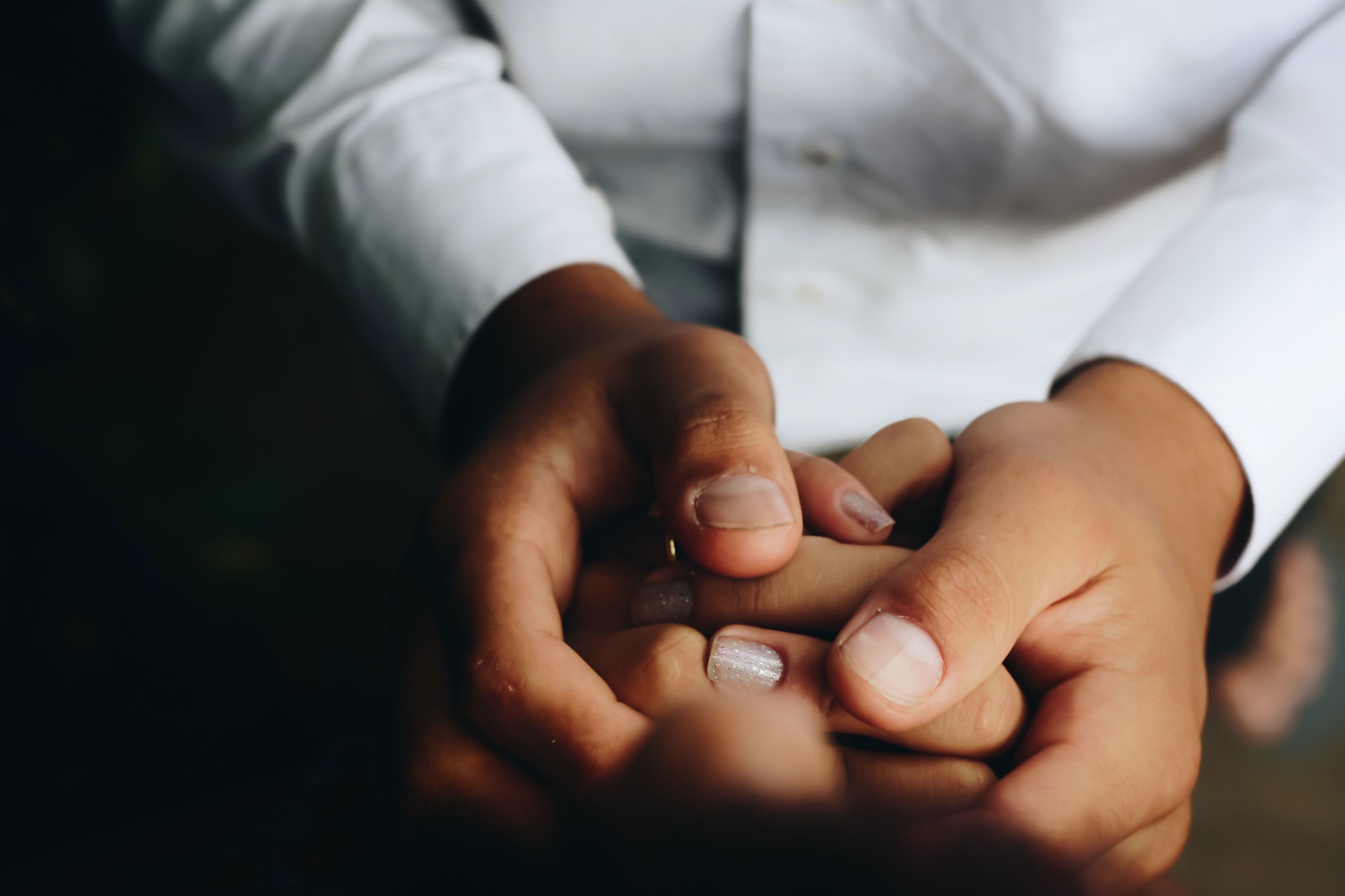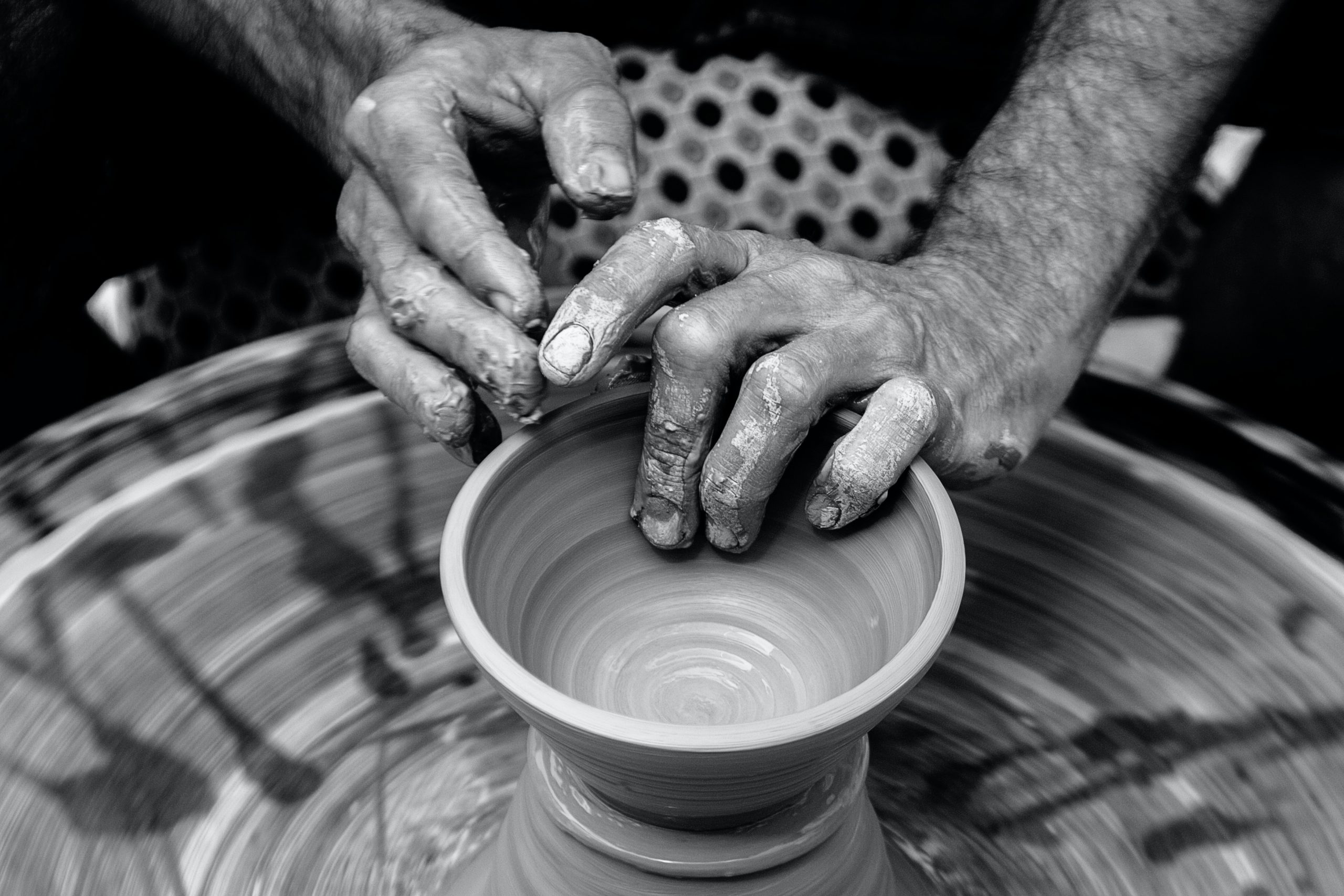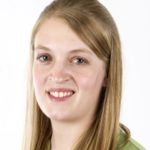I am MHF!
Why do you support Mennonite Healthcare Fellowship?I am MHF
Meet MHF’s New Board Chair – Donna Minter
Getting To Know MHF: Donna Minter
Meet MHF’s Board Chair! Psychologist Donna MinterMHF is first and foremost a FELLOWHIP – we only exist because of our members! In this new series,
Cate interviews each Board Member so you can get to know MHF’s leadership more deeply. We start with Donna Minter, MHF’s Board Chair!
1. Tell us how you first become interested in pursuing a career in health and healthcare? What drew you to your field and how did you initially hope to serve others through healthcare?
My late father, Don Minter, who was a family physician and my mother Marty Minter, who was an educator encouraged me to seek a service-oriented profession. Growing up in Goshen Indiana and attending College Mennonite Church and Bethany Christian High School provided a wealth of role models of people committed to caring for others. When I was a pre-teen, I recall my father saying to me, “Donna, 80% of my patients simply need someone to listen to them.” In response, after first pursuing social work and I eventually decided to study clinical psychology which led me to become a pediatric neuropsychologist working in hospitals and clinics and eventually a forensic psychologist, providing mental health evaluations in the criminal legal system.
2. What has been the most challenging, and the most exciting thing about serving in your area of healthcare?
The most challenging part of working in US healthcare is confronting ego-driven hierarchy of the medical and insurance systems that are focused on profit over patient care. The most exciting thing is finding colleagues who also want to buck these systems by being committed to collaborative patient-focused care. This is why being a part of MHF is so important to me because in MHF I can comfortably assume that others are also committed to finding ways to discuss and practice living our Christ-centered Anabaptist beliefs within the healthcare profession.
3. What do you feel your area of healthcare has to teach the rest of us about holistic health?
Psychology is the scientific study of the mind and behavior. Without understanding the role our mind and behaviors play in our lives and the lives of those around us, holistic health is not possible. Physical health is impacted by psychological health, and psychological health is impacted by physical health. Pursing psychological health along with physical health and spiritual health leads to holistic health.
4. How do you bring your Anabaptist faith into your healthcare practice? What are the particular joys of being an Anabaptist provider and what are some of the challenges?
At the foundation of my Anabaptist faith’s influence on my healthcare practice are Jesus’ first and second greatest commands to love God with my heart soul, and strength and to love my neighbors as I love myself. My “how” of practicing healthcare from my Anabaptist faith is summed up with Doris Janzen Longacre’s 5 Life Standards applied the healing profession:
(1) Do justice for the health and well-being of all
(2) Learn from the world’s health wisdom and communities
(3) Nurture all people’s health and well-being
(4) Cherish the natural order for healthy bodies and the earth, and
(5) Nonconform freely to serve, care and live as Jesus taught.
I experience joy when I practice these standards in various ways and my patients and colleagues respond positively to my efforts. The challenges come when patients and/or colleagues do not recognize the value of what I have to offer.
5. What does MHF bring to you and what made you decide to serve on the MHF Board?
MHF provides me with meaningful relationships with healthcare professionals who are committed to the same Jesus-centered practices/values/life standards as me. I decided to serve on the MHF Board to create deeper community for myself and others. I have to do my part to invest in this community that provides what I do not and cannot access anywhere else as a healthcare professional.
6. What are three hopes you have for MHF and how will we serve in the next 3 years?
#1 I hope MHF’s membership grows to at least 200 active members from around the global.
#2 I hope that MHF’s annual budget will increase so that we can afford a communications staff person so that our executive director can focus on program development and implementation to allow MHF to actively practice its mission to:
1. Nurture the integration of faith and practice
2. Provide opportunities for dialogue on health-related issues
3. Address specific needs through education, advocacy, and service.
#3 Achieve monthly giving by 80 MHF members by the end of 2024 to allow us to go beyond simply supporting our Executive Director. This financial support will provide funding for a part-time communications staff person, MHF regional gatherings, monthly virtual support gatherings, programs, and trainings that are also available to our international members, and
provide the necessary funds to underwrite our Annual Gathering, that next year will be at Laurelville Retreat Center in Mount Pleasant, PA on Friday-Sunday, September 27-29, 2024.
SET Report from Tim Lehman – Serving with IHS in Arizona
Mennonite Health Journal
Articles on the intersection of faith and health
Mennonite Health Journal, Vol. 22, No. 2, August 2023.
SET Report
Tim Lehman
Fort Apache Indian Reservation
Summer, 2023
As a third-year family medicine resident at St. Joseph Hospital in Mishawaka, Indiana, I had the opportunity to collaborate with Mennonite Healthcare Fellowship and Student Elective Term (SET) for an away rotation in Whiteriver, Arizona located on the Fort Apache Indian Reservation.
Throughout my education, both at Goshen College and the Indiana University School of Medicine, I have been interested in learning about and serving different cultures and understanding how these cultures view medical care. I had the opportunity to explore these interests at Goshen College by working in a medical clinic during my study abroad term in Peru. Due to the demands of medical school, I was not able to travel or explore medicine in different cultures during my four years at IU. One of the draws to St. Joseph was the opportunity to spend a month away for a global health rotation, and with the help of SET, the Mennonite Church, and the leaders at Whiteriver Hospital I was able to arrange a month long rotation on the Fort Apache Reservation.
Whiteriver is the largest town in the Fort Apache Reservation with a population of approximately 5000. The reservation is approximately 2500 mi.² and has a total population of 12,000 people. The hospital in Whiteriver provides inpatient and outpatient medical care, emergency, obstetric and mental health services, and offers an in-house pharmacy. In addition to their traditional clinics and hospital services, they also have a community outreach program in which social workers and nurses travel throughout the community to visit patients who struggle with transportation. The hospital and their outreach programs are run by the Indian Health Service, a national organization tasked with providing quality health care to Native Americans.
Upon arriving in Whiteriver, I had a little knowledge of the history of the area, Apache, culture, or the Indian Health Service. Before starting in the medical setting, I visited a local museum to learn more about Apache history and culture. There I learned of a population that takes pride in their surrounding land and their community.
As I transitioned into the medical side of the rotation, I had the opportunity to experience a wide variety of clinical experiences. In the outpatient setting, I spent time with family and internal medicine physicians in a primary care clinic as they saw patients from their respective patient panels. I was able to experience specialty clinics that focus on conditions such as heart failure, pulmonary hypertension, and cirrhosis. A portion of my time was also spent with wound care and orthopedics as they served patients with injuries or diabetic foot wounds. In addition to my time at the main facility in Whiteriver, I saw patients in a smaller clinic 45 minutes from the main hospital. This clinic provided care for patients who were unable or could not afford to make the commute to Whiteriver for their medical care. I also had the opportunity to take care of patients in the emergency department, hospitalized patients on the ward, and obstetric patients, as well as spend time traveling with community outreach nurses as they visited patients in their homes. This was a meaningful experience, not only to see the social situation in which some people on the reservation live, but also to witness the connection the hospital had with the patients in the community.
In the clinic I learned medicine from several fantastic physicians, and, from interacting with their patients, I gained a better understanding of the challenges associated with providing and receiving care in the reservation setting. Throughout the community there are struggles with financial and housing insecurity as well as with substance use. While these challenges are not unique to Whiteriver, it was meaningful for me to see how physicians handled these in the context of the relationship between Native Americans and the United States government. These experiences will prove to be helpful as I transition into my own practice and am tasked with caring for patients from all walks of life with their own individual struggles.
Outside of the clinical setting, I was able to experience Apache culture through events within the community, including attending a sunrise dance. This is a ceremony that is performed for young women as they enter adulthood, and involves dancing and food and is often seen as a way for the community to show their support for the young woman.
As I started my time at Whiteriver, I was unsure what my time there would bring. What I found was a welcoming community of folks that were proud of who they were and where they came from but were honest and open about the struggles they still have. I found a community that was willing to befriend and help teach someone who is an outsider. My time in Arizona has made me more cognizant of the social struggles that different communities experience and the importance of recognizing these struggles to help provide better medical care. This experience reinforced for me the importance of providing cultural appropriate care instead of assuming each patient will have the same experience. As I move forward into my own practice, the experience of SET will continue to impact how I provide care and my involvement with the community in which I work. I am highly grateful for the opportunity that I was given, and I’m excited to see what other opportunities SET recipients have.
Would you like to join the conversation and be a part of supporting rising Mennonite healthcare workers like Jesse explore God’s calling in their vocation?
Stephen Roth Grant Report: Teresa and Dale Regier in Nazareth, Israel
Mennonite Health Journal
Articles on the intersection of faith and health
Mennonite Health Journal, Vol. 22, No. 1, August 2023.
Stephen Roth Grant Report
Serve Nazareth, Nazareth, Israel
April 1 – June 26, 2023
Teresa Regier
Earlier this spring, my husband Dale and I spent 3 months volunteering with Serve Nazareth. We are thankful for the Steven Roth Memorial Grant which was available for us to use toward our expenses. It was a wonderful experience for us both!
I first heard about this opportunity in the winter of 2021 through Mennonite Healthcare Fellowship. The invitation to come serve on the Chaplain team at the English hospital in Nazareth was interesting to me. I had recently retired from my Nurse Practitioner/Nurse Midwifery career, and my husband was also close to retirement. We had always thought that we wanted to make some kind of volunteer work part of retirement—part of the next phase of our lives. We wanted to contribute and help others as well as continue to learn about other cultures and meet new people. Because of my career in health care, the idea of volunteering in and around a hospital felt comfortable, even though chaplaincy was not my area of expertise. I felt that it would be a privilege to minister to both staff and patients, as I could offer care and compassion, as well as to lift them up in prayer. My husband was 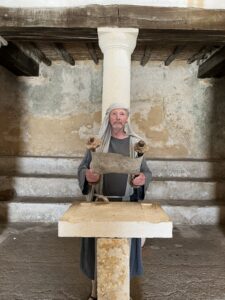 excited about volunteering at Nazareth Village, a first-century authentic living farm and archaeologically accurate re-creation of the hometown of Jesus. We applied for and were accepted as volunteers, but because it was in the middle of covid, we had to wait for the program to open back up.
excited about volunteering at Nazareth Village, a first-century authentic living farm and archaeologically accurate re-creation of the hometown of Jesus. We applied for and were accepted as volunteers, but because it was in the middle of covid, we had to wait for the program to open back up.
We arrived in Nazareth on April 1, 2023 and returned home on June 26. The amount of time we were able to spend here enabled us to feel a little bit “at home” in a culture not our own and was truly unique! We know that we were visitors in Nazareth, but by staying more than a few days and getting to know people in the hospital, village and in the community, we became more than tourists. As we watched groups of tourists with their name tags and back packs make their way through the streets of Nazareth, we felt just a little bit local!
Before arriving in Nazareth, I was informed that I would be serving part time with the Chaplaincy Team and part time in the newborn nursery at the hospital. Although the nursery experience was not what I had originally applied for, it was good and helpful, because it enabled me to interact more with hospital staff and get to know them better. Most days the nursery was quite busy and I worked hard as a volunteer, essentially doing nurse’s aid work. I fed, changed, dressed and undressed babies as well as cleaned cribs and folded laundry. It felt ironic that years ago, before my career as a nurse, Nurse Practitioner, and Nurse Midwife I worked as a nurse’s aid, and now after retirement I “worked” as a nurse’s aid again! It was actually quite freeing—I was working in another culture and my responsibilities were not linked to my credentials or expertise. My career was over— I was there to serve, which I did happily. My goal for myself was—whatever I was asked to do, I would do to the best of my ability. Near the end of my time there, I heard one of the staff tell someone that she loved all of the volunteers because they were willing and happy to do whatever they were asked. It was a good feeling to know that I and others have successfully communicated that intent.
My experience with Christine on the chaplain team was a wonderful experience. I learned about the goal to serve the needs and visit all of the patients and staff, whether they were Christian, Muslim, or Jewish. I found that most patients were very welcoming and appreciative of the visits, even if they were of a different religion. I don’t think that people would respond the same here in the west. My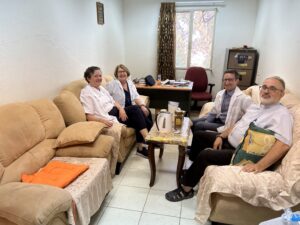 sense is that at home there would be more resistance to having a chaplain visit who was not of the same religious beliefs as the patient. I think in Nazareth there is a unique opportunity to speak into the lives of people of different faiths. Maybe it is the Arab culture which is very welcoming of others; maybe it is the faith connectedness and the fact that it feels more part of the culture than in some places in the west. People in Nazareth seem more accepting of each other’s different belief’s. I suspect it is also that as a minority people within Israel, Nazareth’s larger Arab population feel more connected to each other, even though they may have differing beliefs and religions. I felt honored to be part of the team that prays and shows care and concern for others. And in spite of the language barrier, I found I could convey care and compassion non-verbally. I was able to pray for people when there was some understanding of English, and Christine and I, as well as other members of the team, spent time in prayer together as well. I was also able to participate in a small Bible study with a few hospital staff members and the chaplain team. That in itself was an interesting experience as we spoke a combination of English and Arabic! It was surprising how much meaning I got out of it! I also served on the chaplain team as they led devotionals for the hospital staff and for the staff and volunteers at Nazareth Village, and had the opportunity to give the devotional myself for one of those meetings. I enjoyed getting to know members of the team during my time there—Christine, Frank, and Pastor Suhail! I loved their compassion for both patients and staff, and appreciated their desire to minister to people of all faiths.
sense is that at home there would be more resistance to having a chaplain visit who was not of the same religious beliefs as the patient. I think in Nazareth there is a unique opportunity to speak into the lives of people of different faiths. Maybe it is the Arab culture which is very welcoming of others; maybe it is the faith connectedness and the fact that it feels more part of the culture than in some places in the west. People in Nazareth seem more accepting of each other’s different belief’s. I suspect it is also that as a minority people within Israel, Nazareth’s larger Arab population feel more connected to each other, even though they may have differing beliefs and religions. I felt honored to be part of the team that prays and shows care and concern for others. And in spite of the language barrier, I found I could convey care and compassion non-verbally. I was able to pray for people when there was some understanding of English, and Christine and I, as well as other members of the team, spent time in prayer together as well. I was also able to participate in a small Bible study with a few hospital staff members and the chaplain team. That in itself was an interesting experience as we spoke a combination of English and Arabic! It was surprising how much meaning I got out of it! I also served on the chaplain team as they led devotionals for the hospital staff and for the staff and volunteers at Nazareth Village, and had the opportunity to give the devotional myself for one of those meetings. I enjoyed getting to know members of the team during my time there—Christine, Frank, and Pastor Suhail! I loved their compassion for both patients and staff, and appreciated their desire to minister to people of all faiths.
My husband Dale, spent time dressed and in the character of a Rabbi in the synagogue. Playing the role of Jesus as he read from the scroll in his hometown of Nazareth (Luke 4: 18,19) he was frequently “thrown out of the synagogue” by the guide. Highlights for him were seeing the tour groups from all over the world and witnessing their wonder as the scriptures became real to them. The pageant at Easter time put on by Nazareth Village for the locals was a highlight for him as a participant and for me as an observer.
We also enjoyed getting acquainted with many volunteers coming through the Drs. House, where we all stayed while we were there. We came from many places and had different ideas, accents, etc., but we had Jesus in common and had a kinship in volunteering. It was a unique experience and our bonds were keenly felt, though we knew each other only a short time. Majdoleen, the Serve director was amazing and took good care of us all.
On the weekends, we often explored Nazareth on our own and with other volunteers, and twice were able to visit Jerusalem. Towards the end of our stay, our son Jonathan surprised us with a visit and we spent time sightseeing with him over two weekends.
What are some of the things I have learned during my time there? Smiles are welcome in any language. Even if communication is difficult, a smile goes a long way to make people feel welcome and accepted. Jesus continues to break down all cultural barriers. If we are brothers and sisters in Christ, we have much in common. And it has been so good to worship together with believers in another culture. Even without the commonality of language, it is a unifying experience! People are people everywhere. They may look and sound different, but they have the same joys, sorrows, and experiences all over the world. It has been a good reminder that no one’s culture is foreign to God. He created us with our similarities and our differences and declared that “it was good”. And if culture isn’t foreign to Him, our creator, we should not let each other’s differences make us uncomfortable. It should instead make us curious and make us want to discover more about each other. What a wonderfully unique and interesting world God created!
We will not forget the people we had the privilege to meet and get to know while in Nazareth, both locals and volunteers alike. Nazareth will always have a special place in our hearts and minds!
Would you like to join the conversation and be a part of supporting rising Mennonite healthcare workers like Jesse explore God’s calling in their vocation?
The Anabaptist Healthcare Worker: Pursuing a Call to Nurturing People as a Life Standard
The Anabaptist Healthcare Worker: Pursuing a Call to Nurturing People as a Life Standard
A reflection from Five Life Standards Nurture Council member Jennifer WiebeThe Anabaptist Healthcare Worker: Pursuing a Call to Nurturing People as a Life Standard
What do a cookbook, my work in health care, and following Christ have in common? The answer may be found in Doris Janzen Longacre’s More-with-Less Cookbook. In the book, Janzen Longacre writes about the Five Life Standards, which includes a call to the work of nurturing people. She states that nurturing is feeding, but it is much more than feeding. Janzen Longacre asserts that nurturing “includes all actions that bring others to full life and growth in the kingdom of God.” Janzen Longacre’s vision of nurturing certainly has implications for me as an Anabaptist healthcare provider. Her words beckon me to provide the best care I can for others. They inspire me to do what I can, not only to nurture people’s health, but their entire well-being. Furthermore, at a time when many healthcare workers feel disillusioned and exhausted, there is inspiration in the idea that all of us need to be nurtured and supported, and that we cannot attend to the needs of others until we have received sustenance ourselves.
As I think about nurturing people in the context of my work in providing medical care to Indigenous people in the inner city and on a remote reserve, I think about when it is that people feel nurtured. I remember Russell (not his real name). Russel was a proud Indigenous man, and he was not feeling nurtured by anything that I was doing. We did not connect at all, and even after two visits I could not figure out why he had come in. At one point he suggested that I probably did not care about him or any of his problems. I was at a loss, and eventually our meeting ended in failure. I had certainly done nothing at all to help him. I assumed that he would never be back again, and I felt frustrated and defeated. A while later that same day, I realized that Russell was still in the clinic, sitting all by himself. I decided to offer him a cup of coffee. He looked at me strangely, smiled, and accepted the coffee. Then he asked if he could make an appointment for the following week, since he had so many concerns that he needed to talk about. At that moment, everything changed. On that day, the two of us forged a friendship that would last for many years, and I feel blessed at the opportunities we have had to learn from each other. All of this happened because of one cup of coffee. With this cup of coffee, I was able to offer some physical nourishment to him, and I believe that he felt nurtured in other ways as well.
The story of Russel and the cup of coffee shows what can happen when we pay attention and work towards nurturing others. Although not all situations have such a positive ending, Anabaptist healthcare providers generally are nurturing people. This may go back to the days of Menno Simons, who is 1539 stated that true faith “feeds the hungry, it comforts the sorrowful,” and it “binds up that which is wounded.” As healthcare workers, we see a lot of hungry, sorrowful, and wounded people, and we want to fulfill the call to provide care and nourishment for them.
Although our goal as healthcare providers and followers of Christ is to nurture others to health and well-being, there are times when the extent of the need seems overwhelming. There seems to always be another serious health problem or another mental health crisis. This is especially discouraging when we see how certain groups of people are suffering disproportionately in our society. One glaring example of this is the unequal effect that the pandemic has had on particular communities. Sometimes the crushing problems seem formidable, and it is all one can do to get up in the morning to face another day.
Considering that healthcare providers spend much of their time nurturing others, it is important that they are nurtured themselves. This can come in many forms, and depending on the person, may include activities such as meditation, listening to music, creating artwork, doing a physical activity, or discussing the concerns of the day with a trusted friend. Christians in healthcare can also go to the source of all nourishment. Christ bestows on us refreshments and the provisions of life, including daily bread and living water to sustain us during life’s most difficult trials. As seen in Jeremiah 17:7-8, those who trust in the Lord are blessed, and are like trees planted by the water.
In John 13:14, Jesus himself uses the symbol of water to teach his disciples about the need to receive support and nurture for themselves. In this passage, Jesus pours water on the feet of the disciples, and then washes them. By doing so, Jesus is showing his love for them, and is a source of encouragement to them. Jesus’ act of washing the disciples’ feet also prepares them for the work ahead. He says, “Now that I, your Lord and Teacher, have washed your feet, you also should wash one another’s feet.” It is only after Jesus provides for his disciples and nourishes their souls that he invites them to follow his example to nurture other people as well. Furthermore, Jesus shows the disciples exactly how they are to nurture and support others. Since only servants usually washed people’s feet, Jesus puts himself in the role of a servant, and therefore exemplifies an attitude of humility. In addition, the act of Jesus washing the disciples’ feet meant that the disciples were no longer just people that needed to be provided for. Instead, Jesus’ act of love suggests that he and the disciples are now in a different kind of relationship. They are no longer just teacher and student, but they are now friends. Jesus is a role model for healthcare providers, and is an example that we should embrace. Like Jesus, we are to serve others with compassion and humility, and the relationship we have with the people we serve makes all the difference.
Besides using water to nurture his disciples, Jesus also used five loaves and two fish to nourish an entire crowd. As we see in John 6:9, he used a young boy, a child, to make it all happen. Jesus used that meager lunch to bless and feed thousands of people. This all happened because the child “showed up,” and was willing to give what he had. Jesus changed everything, and used this lunch to abundantly provide for everyone. He used the offerings of a child to show compassion and mercy to each person that was there that day.
Doris Janzen Longacre talks about aspiring to a life of nurturing as a life standard. This certainly applies to healthcare providers. Sometimes we need to be nurtured ourselves, and need to let Jesus wash our feet. At other times, our small attempts at nurturing may turn into something life-giving. Sometimes, like the boy with the loaves and fish, we just need to show up and make ourselves available. And sometimes, all it takes is a cup of coffee.
Thank you, Jennifer, for this beautiful reflection. Do you have a reflection on the way(s) any of the Five Life Standards impact your work and living? Submit to Cate! cate@mennohealth.org. Please consider joining us for Annual Gathering for in-depth, connected discussion of the Life Standards and how we renew and rejuvenate ourselves as healthcare providers.
Racial Justice is Integral to Health & Shalom
Racial Justice is Integral to Health & Shalom
MHF Statement on the Killing of George Floyd
MHF is a collective of healthcare providers committed to Mennonite principles of non-violence, justice, and service.
As such, we publicly condemn the killings of George Floyd, Ahmaud Arbery, Breonna Taylor, and all instances of state-perpetuated violence. These killings have occurred in the midst of the Covid19 pandemic which has inflicted disproportionate harm and death on Black bodies and communities. We believe that achieving Racial Justice in this country and worldwide is integral to bringing true health, healing, and Shalom to our world. We believe that Jesus stood with and for the marginalized, giving himself up to state-perpetuated violence to reveal both its horrors and its ultimate weakness against the full power and Shalom of God. As healthcare providers committed to the Way of Peace, we stand in solidarity with the Black community in calling for a recognition of the harms of racism and the necessity of racial justice within and external to our healthcare systems.
We pray as Jesus taught us: “Thy kingdom come, thy will be done, on earth as it is in heaven.”
For our members looking for resources for themselves and their congregations, here is an extensive lists of Anti-racism resources.
Membership Campaign – Join the Conversation!
Fall Membership Campaign launched
Join the conversation on faith and health!Join the Conversation!
MHF launches Fall Membership Campaign
“I was surprised! Mennonite Healthcare Fellowship grabbed my heart!” Thus begins a special letter to all of you from our new Board President, Clair Hochstetler. I hope MHF will grab your heart as well! Please read on to learn about our Fall Membership Campaign which invites you and hundreds more Anabaptists to Join the conversation!
Mennonite Healthcare Fellowship is responding to the diverse needs of Anabaptist healthcare professionals. This new program year as of September 1, MHF is striving toward the goals of mutual support, education, mentoring, and mobilization for service by implementing these strategies around the theme, “Join the conversation on faith and health!“:
Fall Membership Campaign
This year’s Membership Campaign focuses on encouraging even more Anabaptist healthcare professionals to join MHF! Join the conversation! From September through December, MHF usually receives 50-60% of its yearly income. Let’s make that even higher this year by each of us finding at least one other person to join the conversation at MHF! This will get MHF off to a good start!
Gatherings for the future
MHF is projecting an expansion of opportunities for face-to-face Gatherings and Meetings. Starting in 2020, MHF will hold its Annual Gathering in the early fall. Between now and then Regional Gatherings will be organized in various locations. The plan also calls for revivng Regional Meetings on weekday evenings. Student meetings will also be added to reach out to a new generation of students.
Tools to make personal invitations
Please consider seriously getting personally involved in encouraging others to Join the conversation!
- A six-minute YouTube video to share at your church or in some other setting.
- Membership Information Form (PDF) — Download, print copies, and share.
- Letter from MHF Board President.
- Information about this year (page 2 of letter).
Ambitious Goals!
All of these plans and projected activities are part of an overall effort to reach more Anabaptist healthcare professionals in the coming year. To succeed, they require the efforts of current members as well! Your support is crucial:
- Renew your membership contributions.
- Invite a friend or colleague to join.
- Plan for Annual Gathering in September 2020
- Help organize a Regional Gathering or Regional Meeting.
All of this at Join the conversation!
Thanks for your support!
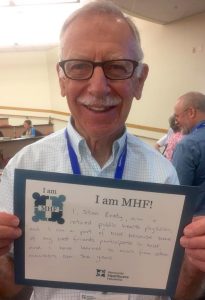 Stan Reedy
Stan Reedy
Washington, DC
Retired Public Health Physician
I am a part of MHF because some of my best friends participate in MHF, and I have learned so much from other members over the years.
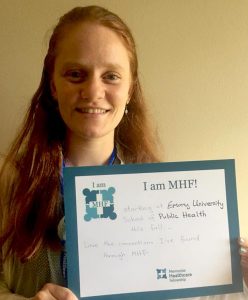 Nicole Groff
Nicole Groff
Lancaster, PA
PA & Public Health Student
I love the connections I’ve found through MHF!
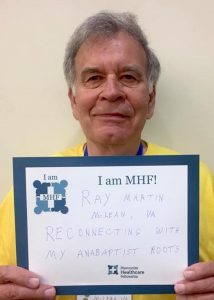 Ray Martin
Ray Martin
McLean, VA
Retired Public Health
[I am MHF to] reconnect with my Anabaptist roots.
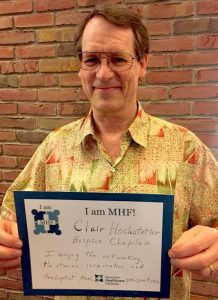 Clair Hochstetler
Clair Hochstetler
Cincinnati, OH
Hospital Chaplain
I enjoy the networking, the stories, inspiration, and Anabaptist theological perspectives.
Let’s put a face to MHF! Join us in this photo campaign to share why you are a part of Mennonite Healthcare fellowship!
It’s easy!
There are two ways to contribute:
1) Use our Facebook Camera photo frame (link) in the Facebook app to take a photo, video, or put on an existing picture.
or
2) Write or print on your “I am MHF” card (JPG or PDF) and take a photo holding it.
You could even do both!
We would love to hear from everyone why they think MHF is important, why they participate in MHF, and/or what they appreciate about MHF. So include in your photo or its caption this sentence:
I, (your name), am a (your profession) and I am a part of MHF because (your answer)!
Finally, post the photos on our Facebook page, your Twitter feed, or submit them below so we can all see the great community that makes up MHF!
And don’t forget to use our Hashtags: #MennoHealth #IamMHF
Submit your "I am MHF" photo here:
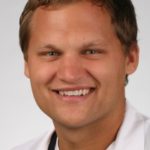 I had an amazing experience working in Roatán, Honduras and learned many valuable lessons that will serve me for years to come. In addition, after years of hard work in medical school and starting to wonder if I had taken the right path, I believe I found my answer in Roatán where my passion for medicine has been restored. The rotation challenged me physically, mentally, and emotionally. I know it will profoundly change the way that I think about medicine.
I had an amazing experience working in Roatán, Honduras and learned many valuable lessons that will serve me for years to come. In addition, after years of hard work in medical school and starting to wonder if I had taken the right path, I believe I found my answer in Roatán where my passion for medicine has been restored. The rotation challenged me physically, mentally, and emotionally. I know it will profoundly change the way that I think about medicine.

